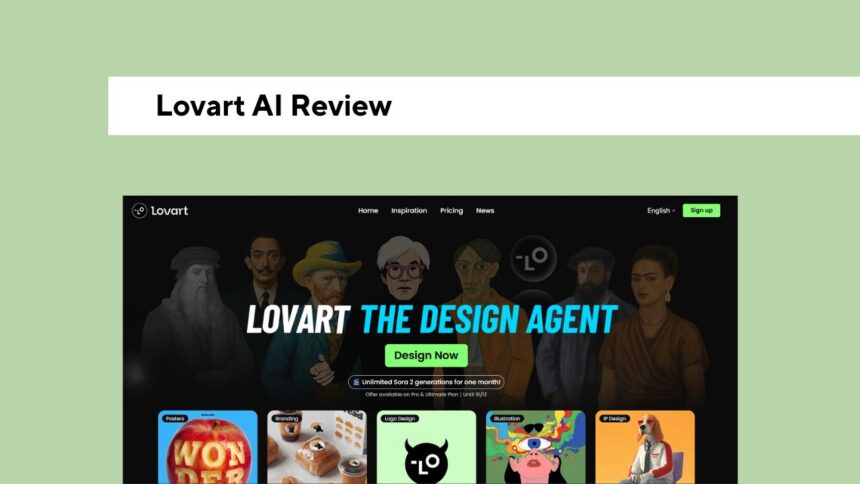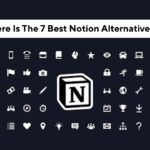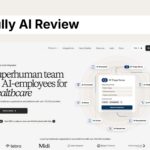Lovart AI is a platform for design-agents (generative AI tool) that helps users in creating content for small businesses, freelancers and freelancers to create visual branding design, multimedia, and design content.
It’s not just an image generator. It now become a “creative partner,” combining several AI models tools, workflow, and features to ensure that from one prompt, you can receive a set of coordinated design outputs (logos and videos, brand assets layouts, etc. ).
It claims that it has created an engine for creative reasoning (called “MCoT” / “Mind Chain of Thought”) that assists it in interpreting the intent of design, recognize the context of business, and create outputs that go beyond mere stylised visuals. They’re designed to be consistent and fit with branding across formats.
It’s out of beta at mid-2025, and is available for public download. It has grown to a large number of users (~800,000) across several nations.
How to Use It
Here’s the way Lovart AI generally works, according to the documentation, user feedback as well as from my use case
- Sign Up/Get Access: You could begin with a no-cost plan (or credit cards for free). There are sometimes beta or invite code requirements in the earlier stages.
- Define Your Ideas: You will be asked (natural language) in which you describe the idea. E.g. “Minimalist skincare brand, ocean-inspired, pastel blues, logo and social media kit.” The AI seeks to understand the design needs and contextual factors.
- Generation : Lovart utilizes its own reasoning engine that chooses and coordinates relevant AI models, and generates various design options, pictures, layout ideas and brand kits, occasionally images or sketches.
- Review & Refine
You can select from the templates and make changes (layout colors, layout, typography, etc. ) or tweak things. There’s support available for certain edit tools (e.g. background removal, style transfer, layer editing, etc.) to fine-tune. - Export / Use
After refinement, you export your content. Lovart supports a variety of format options (PNG, JPG, SVG and PDF) according to your plan. You can use the outputs commercially (depending on subscription/licensing)
Example:
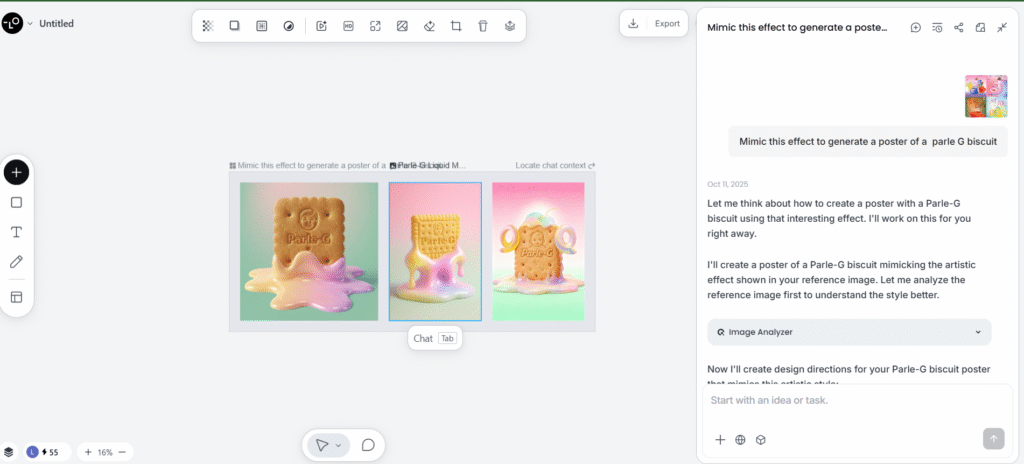
Features
Here are the most important characteristics in Lovart AI, from public sources and user feedback
- Multimodal Design outputs logos and branding kits Social media graphics, mockups of products, and possibly the generation of video/storyboards.
- The Creative Reasoning Engine (MCoT) interprets prompts, breaks down creative tasks, decides on which tools or models to use.
- Echtzeit Editing Tool Editing layers and colouring typography, layout adjustments.
- Brand Consistency/Branding Tools maintaining the style palettes and consistency across different assets.
- Multiple Export Formats: JPG, PNG, SVG, PDF.
- Multiproduct / Batch Outputs Generate multiple versions, variations or product displays in various angles and scenes.
- templates and style Libraries A variety of designs, templates curated with ready-made designs for you to start work.
- Commercial License Outputs are able to be used commercially in paid rates.
Pros and Cons
Here are the things that appear to be its strengths as well as drawbacks in my review and user feedback.
Pros
- Speed & Workflow Efficiency
Lovart allows you to move from idea to tangible assets faster than everything manually, or having to use multiple applications. Its prompt, generation and refinement loop is simplified. - Good for Non-Designers
Since you don’t require deep design expertise The system helps you and lets you experiment in more streamlined ways. Ideal for small companies, solo entrepreneurs and those who require branding without the expense of hiring a full design team. - Multi Assets from a One Prompt
Making a complete package (logo or mockups of social media, visuals) from a single prompt is a great idea. This saves time. - Commercial Use is Allowed (for paid levels)
You can make use of your business ideas in marketing, sales, and so on. It is essential. - High Quality Outputs
A lot of users have reported that their outcomes have been “polished,” “cinematic,” or “professional grade” especially for branding mockups, visuals.
Cons
- Customer Service / Refund & Support Issues
There are a variety of complains (on Trustpilot etc.) about refunds being denied or support not being responsive and being charged regardless of cancellation, or problems. - Fine-Editing Limitations
While you are able to refine the design, for more advanced or detailed editing, the options are not as flexible. People who want pixel-perfect or customized tweaks will face limitations. - Trust / Legitimacy Concerns
Certain users are cautious. Scam advisor gives a low scores on trust for some sites, especially where identities are concealed. Certain transparency issues. - Cost vs Usage / Credit System Complexity
For use that is heavy (many videos, images, etc. ) Costs can pile up. In addition, credit systems and understanding the value of each credit requires some education. - Beta / Early Access Bugs / Interface Issues
Users report issues and slow performance during high-speed, UI elements not saving correctly, etc. Some features still maturing.
People’s Reviews / What Users Say
Here’s the summary of what people have been saying about their experiences, positive and negative taken in Trustpilot, Reddit, news reviews and more.
Positive Feedback:
- Many are impressed by the speed with which Lovart speed up branding or design tasks dramatically. For those with no design experience the ability to create complete branding kits in less than an hour was impressive.
- Users appreciate the quality of output Clean, polished, visually robust. Particularly, for mockups, logos or social media graphic.
- The interface is thought to be easy to use by a large number of users. The flow from prompt to options to refine is well-liked by users.
Critical feedback or negative comments:
- Issues with refunds, billing, or customer service. Some customers claim they were charged for cancellation or were unable to get help.
- If more precise, sophisticated or specific design work is required the Lovart method may not be enough. Control over the details isn’t as good.
- Some people feel that a lot of the ideas generated are merely generic and require some adjustments before they are useable. It’s true that the “inspiration” is good but polishing is still a laborious process.
- There are also concerns about reliability due to the concealing of ownership information or delays in support or unclear the policies.
5 Alternatives
If Lovart AI isn’t able to satisfy your requirements (or you’re looking to test it against other tools) Here are five other tools you could try, as well as what they can do to make them better:
| Alternative | What does it do well? how to utilize it | The key differences between Lovart and Lovart |
|---|---|---|
| Canva Pro | It is extremely strong for templates-based design and user-friendliness numerous integrations and collaborative capabilities. | More generative AI; less hand-control; could mean more effort to create a completely custom branding |
| Adobe Firefly / Adobe Creative Cloud | Quality visuals, adept at editing photos, vector graphics; a trusted brand with a well-developed toolset | More complicated; steeper learning curve, licensing may be more costly |
| Figma | Ideal for UX/UI design, prototyping Collaboration | More control for precision Not so much as generative AI branding kits and visuals (unless using plugins) |
| Midjourney / Stable Diffusion / Leonardo.ai | A powerful generative image stylization. imagination; artistic / experimental visuals | A less efficient workflow for branding kits; could have to mix tools manually There are fewer templates and interfaces built into the software for mockups, videos etc. |
| Brandmark / Looka | Specialized branding and logo creation Some are more simple and faster for creating a branding and identity | It is more limited in the integration of different types of assets and less multimodal (video etc. ) Sometimes more rigid template designs |
Pricing
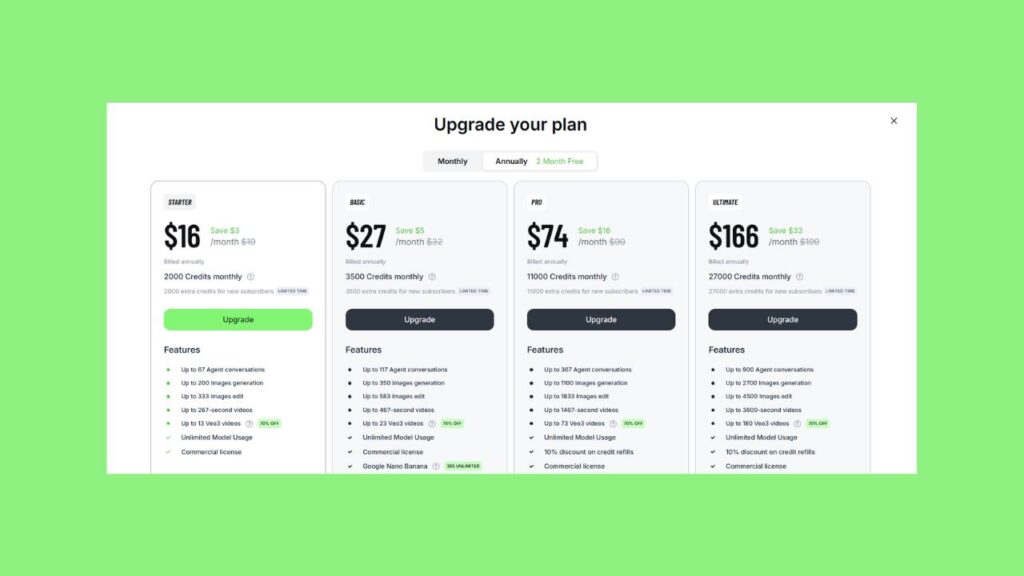
Here are the most current prices for Lovart AI, as of the mid-to-late 2025 timeframe, with information from official sources and reviews:
| Plan | Monthly Price (approx) | Credits / Key Details | Who it’s for |
|---|---|---|---|
| Free / Hobby | ~$0 | $500 credits to new customers; a few daily log-in bonus; limited options / models; free plan that is great for testing. | |
| Starter | $ 19/month (some sources suggest $15 based on the billing, etc.) | 2500 credits per month for commercial license; chats with agents access to models. | |
| Basic / Plus | ~$26-32/month | 3500 credits per month; more resources (images/videos) and style options; greater usage. | |
| Pro | ~$72-90/month | 11,000 credits/month; full set of features; ideal to more frequent or professional use. |
Be aware that prices can vary in accordance with monthly vs annual billing, location, promotional offers as well as credit bundles. Additionally”credit” in the “credit” system means more outputs require more credits, in particular with high-quality videos or images.
Conclusion
Lovart AI can be described as an incredibly powerful and effective tool for those needing branding and design without the expense of hiring huge teams. It provides a lot of advantages:
- Ideal for entrepreneurs, founders or content creators looking for something that is polished fast.
- The free version is good and lets you check if the workflow is suitable for your needs.
- The strong multimodal outputs (images and mockups, layouts) generated from single prompts are extremely useful.
However, there are pitfalls to be aware of:
- Issues with customer support and refund policies could be a danger. If you’re paying for a refund, ensure you know the conditions.
- If you require very precise control, high customization, or top-quality designs (for huge clients or branding authority) You may run into the limits.
- The legitimacy and trust issues brought up by users warrant being cautious. Look for reviews that are up-to-date and first try a small sample.
Overall, I’d recommend Lovart AI as a valuable tool in your creative toolbox, especially for speeding up early design, creating brand assets, generating ideas, or for small-scale/professional work where time matters.
If you choose to utilize it, I’d suggest beginning on the free version (or smaller paid plans) to determine if it will meet your needs (style quality edits etc.).) before you commit to a larger subscription.


